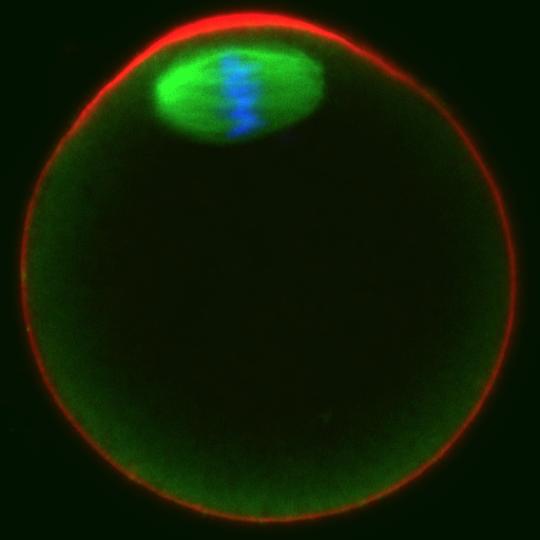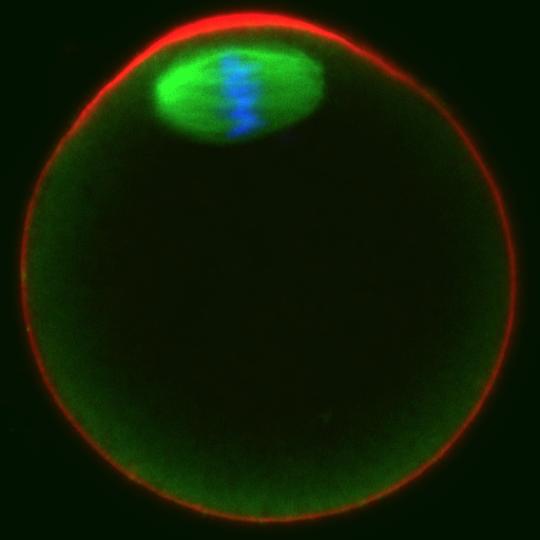
Credit: Monash Biomedicine Discovery Institute
Findings from new research led by the Monash Biomedicine Discovery Institute (BDI) and University College London may finally resolve, and potentially provide answers, as to why older women have higher incidences of miscarriage and have babies with chromosomal abnormalities.
Female fertility declines rapidly after the age of 37 — with women over 42 having only a five per cent chance of having a baby without fertility treatment. The problem is that as a woman ages, her eggs also age — increasing the chances of chromosomal abnormalities. This leads to an increase in conditions such as Down's syndrome, where the egg has three copies of chromosome 21. However most chromosomal abnormalities in eggs lead to embryos that either fail to implant in the womb, or miscarry soon after implantation. In women over 40 most miscarriages are caused by the wrong number of chromosomes being present in the egg.
In a paper published today in Nature Communications, Professor John Carroll from the Monash BDI, together with an international team of collaborators, reveal a fault in how the egg controls the levels of a protein called securin. In the final stages of egg development just before ovulation, it undergoes two specialised cell divisions known as meiosis I and meiosis II. Securin is important for both divisions but in old eggs, it appears that there is insufficient securin remaining to ensure meiosis II takes place normally.
Most chromosome abnormalities occur in the first egg division (meiosis I) but it is known that a substantial number of abnormalities also occur during meiosis II. Dr Ibtissem Nabti and Professor Carroll's experiments help explain why things go wrong in this second division. In these older women the chromosomes in their eggs start to fall apart because there is insufficient securin to control the process. Dr Nabti, formerly from University College London, is currently at the Abu Dhabi campus of New York University.
The discovery opens the way to improving an older woman's chances of having eggs with fewer chromosomal abnormalities through regulating the processes that control securin levels in the two divisions of the egg or controlling the protein that securin regulates (a protein called separase).
According to Professor Carroll, new therapeutic approaches to improving egg quality in older women is very important at a time when the age at which women are having their first baby is increasing.
"It is immensely challenging because any treatments need to be safe for the egg and subseqents embryo and would usually need to be applied while the egg is in the ovary," Professor Carroll said.
"It may one day be possible to perform treatments in-vitro (in the laboratory) but human in-vitro egg maturation is not yet very successful."
The research team is working with Monash IVF to improve in vitro maturation and identify new targets that may be able to better control prevent the degradation of Securin, according to Professor Carroll.
"Now that we have an idea of at least one of the causes of the increased incidence of chromosomal abnormalities and miscarriages in older women, we can attempt to find ways to prevent this happening," Professor Carroll said.
###
Infertility and Ageing – Some Facts:
- At birth, a woman has all the eggs she will ever have.
- As an egg ages it is more likely to develop a chromosomal abnormality.
- A fertilised egg with abnormal chromosomes is the single most common cause of miscarriage: at least half of all miscarriages are due to abnormal chromosomes.
- A woman in her 20s has only a 12-15 per cent chance of having a miscarriage each time she becomes pregnant. On the other hand, a woman in her 40s faces on average a 50 per cent risk of miscarriage.
About the Monash Biomedicine Discovery Institute
Committed to making the discoveries that will relieve the future burden of disease, the newly established Monash Biomedicine Discovery Institute at Monash University brings together more than 120 internationally-renowned research teams. Our researchers are supported by world-class technology and infrastructure, and partner with industry, clinicians and researchers internationally to enhance lives through discovery.
Media Contact
Monash Media
[email protected]
61-399-034-840
@MonashUni
http://www.monash.edu.au
Related Journal Article
http://dx.doi.org/10.1038/ncomms15346





